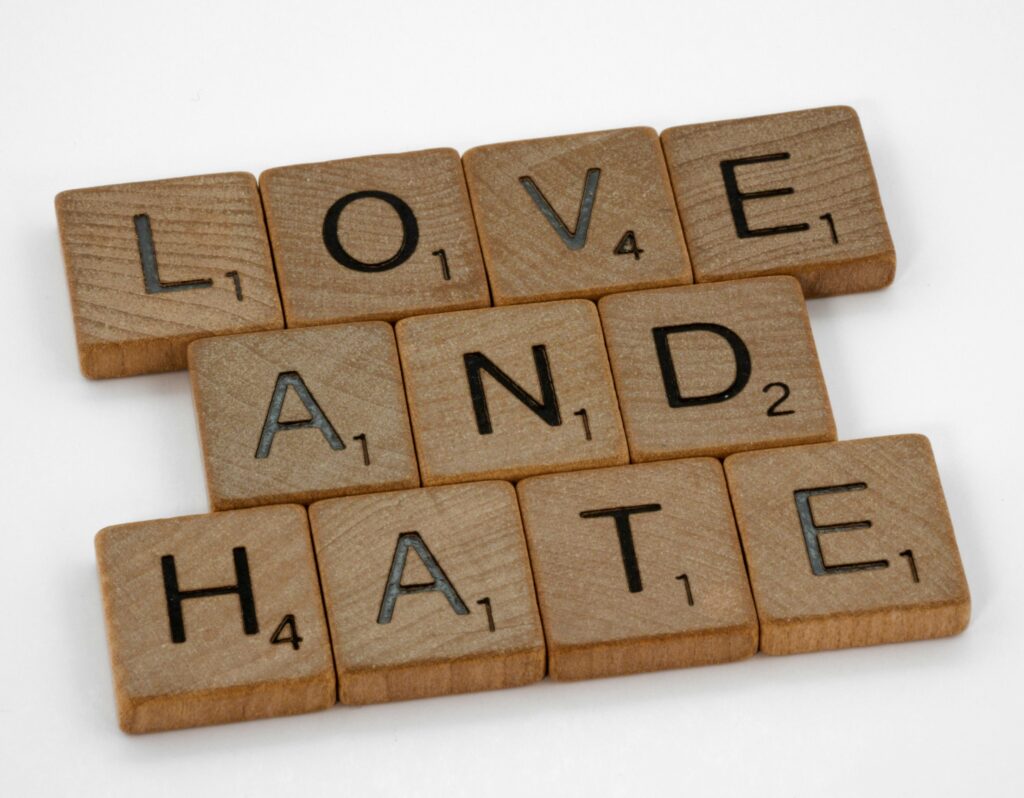
Love and hate are an interesting duo. Love is a powerful concept we are all drawn to. It makes us belong and feel whole. It gives us the sense we are complete. And have everything we need. When in a state of love, everything seems beautiful because deep down we are seeing ourselves as beautiful. As creatures of projections, the truth is that what we see in others is not merely a reflection of them, but also a glimpse into us. We see in others what we see in ourselves. That’s why when we are in a feeling of “love” or “utter bliss,” it’s so easy for us to give to others. Our giving is emanating from a core that feels it has been given to so bountifully. Once there, it’s only natural that we want to give back in a very real way.
When we think of love, many of us are quick to contrast it with hate. We think the two are fundamentally different because they seem to lead us to noticeably different places. After all, one makes us feel good about who we are, while the other really bad. One brings out the best in us, whereas the other the worst. One makes us feel cherished and cared for, the other small and insignificant.
However, love and hate are not so different. At the core, hate is not what it looks like. Hate is not about hurting others, it’s not about bringing down others, and it’s not about trying to overpower others because we think “they deserve it.” It’s about us, and what we’re trying to communicate, but appear to have difficulty doing in the heat-of-the-moment. Hate is our defense in times of passion, an expression of our own frustration in not being able to face what we really feel inside. What we’re usually looking for: connection.
In our reactivity, we’re really trying to reconnect with ourselves and that who we say we hate. We might be feeling hurt, frustrated, or scared by what they’ve said or done, but deep down we just want to be acknowledged. We want to feel a part of. We want to feel like we matter. Inside, we are so moved by them, we care so much about them, that how they treat us influences us in a striking way. We want things to work out, we want there to be peace, we want there to be harmony. Yet, on some level we also know that to really get there, we will have to take that risk of showing who we are. We will have to admit that we have been affected by them, and that they matter to us. Often getting in touch with this part of ourselves can make us feel so uncomfortable and overwhelmed that usually we prefer to retort by putting our walls up with our fingers drawn pointed out.
Interestingly, hate tricks us into resisting that with which we actually want to connect. The desire to connect is so strong, and the associated fear of getting hurt so strong, that when the two are at odds we feel torn. The feelings get so emotionally raw that it makes us uneasy. We want, but we are also afraid to want. So we respond by trying to push away whatever it is that’s making us feel this way. It’s not the people we’re pushing away, it’s what they stir up in us, the discomfort they evoke in us that we’re trying to cast away. All the while, the reality is the more we resist them, the more we probably want them. The more we try to erase them, the more we probably want to remember them. The more we push them away, the more we probably want them to stay.
The more we understand who we are, what we want, and where we want to go, the more love and hate cease to exist as separate, and the more they become one. Simply, a desire to bond. It’s easy to be honest about how we feel when things are going well, when we feel an abundance of love, appreciation, and acceptance. At the same time, it’s interesting to think about what this world would be like if every time we experience hate or find ourselves pushing others away, we were to go a little deeper, and get in touch with what we might be really trying to say. Namely, “I’m drawn to you. I want to get close to you. But I’m too scared to make myself vulnerable and share this with you because I don’t know what will happen. I’m scared you might not want me the way I want you, or the way I want you to want me. I’m scared you might not accept me, and you might even use what I say against me. I’m too scared to admit you affect me, you influence me, you have power over me. I’m so afraid of you finding out how I really feel about you that I’m going to try to throw you (and myself) off. I’m going to strike you, judge you, and blame you to push you away. I want to push you away because seeing you reminds me of the feelings I have that I’m not ready to deal with. One day, I might gather the courage to access and even share these feelings with you, but right now I’m too scared. Scared I might get hurt. In the meantime, I’ll keep focusing on you, and pushing you away so I don’t have to face my vulnerability.”
Love and hate are two sides of the same coin. Both are strong, charged, passionate responses to our deep care and desire to adjoin. Love is more honest, while hate more reactive. Love is more genuine, whereas hate more defensive. Love conveys a wish to get close, whilst hate a fear of getting close.
Not just to others, but perhaps, more importantly, to ourselves as well.

